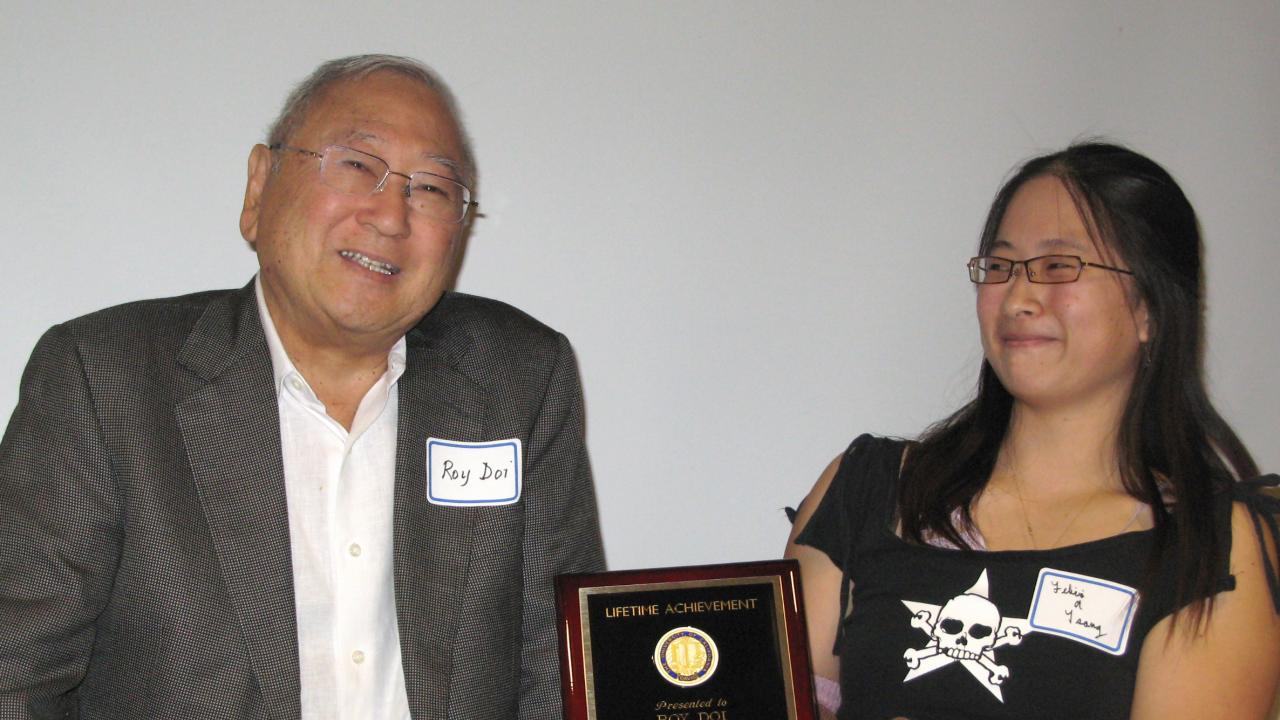
Memorial Fund Established to Honor Distinguished Professor Emeritus Roy H. Doi
Roy H. Doi, distinguished professor emeritus of molecular and cellular biology, was a leader in advancing understanding of the mechanisms that control bacterial gene expression. Elected as a member of the National Academy of Sciences in 2006, Doi was recognized for his career contributions in molecular biology and biotechnology.
On Oct. 9, 2017, Doi passed away peacefully at home, surrounded by family, at the age of 84. He was diagnosed with inoperable cancer earlier in the year.
Honoring Roy Doi’s memory
A memorial service for Doi will be held at noon Saturday, Nov. 11, at the Putah Creek Lodge on the UC Davis campus (doors to open at 11:30). In lieu of flowers, the family requests that gifts be made to the UC Davis Roy H. Doi Memorial Fund.
The fund will support student research in the Department of Molecular and Cellular Biology. Gifts to the fund will build an endowment in memory of Doi’s contributions as a researcher, instructor, mentor and advocate on behalf of biochemistry and biotechnology.
Gifts may be made online at https://give.ucdavis.edu/go/roydoi and checks may be made payable to the UC Davis Foundation and sent to UC Davis, Development and Alumni Relations, Advancement Services, 1460 Drew Avenue, Suite 100, Davis, CA 95616.
Doi’s early years: an unlikely path to science
Born in Sacramento on March 26, 1933, Doi grew up in the nearby farming town of Loomis. His parents had emigrated from Japan in the early 1900's and worked as migrant farm laborers to support their family of six children. In 1943, the family was forcibly removed from their home by the United States government along with 110,000 other Japanese-Americans.

The Doi family spent the next three and a half years incarcerated in the Tule Lake and Heart Mountain internment camps, losing everything they could not carry with them. Through these early experiences, Doi developed an abiding compassion for those less fortunate than himself, and throughout his life, he supported civil rights and other human justice and progressive causes.
When the family was released, Doi returned to and graduated from Placer Union High School in Auburn, California, graduating in 1949. He then attended Placer Junior College in Auburn and after two years transferred to UC Berkeley, where he completed a bachelor’s degree in physiology in 1953. Following graduation, he was drafted into the U.S. Army.
Upon completing basic military training, Doi was stationed at Camp Kilmer, N.H., where he was introduced to microbial research through a genito-urethral research project. His interest intensified when he was deployed to Japan and assigned to a medical unit studying encephalitis (a disease similar to West Nile fever), and culminated in his decision to pursue graduate studies.
Discharged in 1955, Doi returned to Berkeley where he completed a second undergraduate degree in bacteriology in 1957. He then attended the University of Wisconsin, where he studied bacterial sporulation under Harlan Halverson and obtained his Ph.D. in 1960.
Doi then held a postdoctoral position at the University of Illinois at Urbana-Champagne with microbiologist Sol Spiegelman, who was interested in the replication of RNA viruses. In 1963, Doi launched his laboratory at Syracuse University in New York, before returning to the Sacramento area in 1965 when offered a position at UC Davis.
Professor and mentor: building a legacy at UC Davis
During his early career, Doi studied RNA polymerase, ribosomes, transfer RNA and other components of the machinery genetic regulation in bacteria. Most notably, he observed that sporulating Bacilli contain several forms of RNA polymerase, leading to the discovery that multiple sigma factors guide RNA polymerase to specific gene promoters.
In the mid-1980s, he was appointed to lead a campus committee on biotechnology and became interested in applied fields of biochemistry and molecular biology. After learning that the California State Legislature planned to pass an environmental law that would outlaw the burning of rice straw by 2001, Doi switched gears to pursue research in cellusome, complex enzymes and proteins secreted by several bacteria that break down cellulose and other components of plant cell walls into sugars.
In addition to seeking a less-polluting way to break down the rice straw, Doi saw in cellusome processes an opportunity to develop new sources of renewable energy.

During his 40-plus years of service to UC Davis, Doi mentored many students from undergraduates to postdocs, including international students from Japan and other countries, many of whom he stayed in touch with throughout their lives.
Due to his childhood experiences, Doi developed an abiding compassion for others, supporting civil rights, social justice and other progressive causes. In 2004, the UC Davis Asian American Studies Program recognized him for outstanding commitment, generosity and service to the community.
Doi is remembered for his intellectual curiosity, humility and compassion. He is greatly missed by his family and his colleagues in the scientific community here and around the world.
